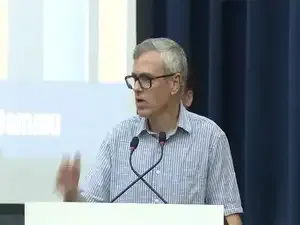India will be able to address the apprehensions of the private sector globally about investments in the civil nuclear sector, which was opened up to achieve the ambitious target of producing 100 GW atomic power by 2047, Union Minister Jitendra Singh has asserted.
Singh, who oversees the Department of Atomic Energy, said changes in relevant rules and legislations will have to be made to facilitate the entry of the private sector in the field of nuclear energy, which currently is under tight control of the government.
"The announcement has already been made in the Union Budget, but we will have to frame rules, also possible legislation to actually move on, which will take a lot of consideration, a lot of introspection," Singh told PTI in an exclusive video interview.
Finance Minister Nirmala Sitharaman, in her budget speech in February, announced the government's intention to amend key legislation, including the Atomic Energy Act and the Civil Liability for Nuclear Damage Act, to facilitate private sector involvement.
Currently, the Nuclear Power Corporation of India Limited (NPCIL), Bhartiya Nabhikiya Vidyut Nigam Limited (BHAVINI) and NPCIL-NTPC joint venture company Anushakti Vidyut Nigam Limited (ASHVINI) can build nuclear power plants in the country.
Scientists at the DAE are also developing the Bharat Small Modular Reactors ranging from 50 MW to 300 MW each for installation in thermal plants which have completed their operational life.
Singh said the legislative changes to the Civil Liability for Nuclear Damage Act are aimed at addressing the concerns of the private sector that has been reluctant to invest in the nuclear power segment.
"It is just that the suppliers, most of them private and most of them from the other countries, had their own apprehensions from a business point of view. I am sure in the course of time, we will be able to address that also, able to satisfy them and reassure them to venture in," Singh, the Minister of State in the Prime Minister's Office, said.
Singh said the decision to open up the nuclear sector for private participation was more difficult than unleashing space sector reforms.
"It has been possible only because of Prime Minister Narendra Modi's personal indulgence. Even the nuclear sector stakeholders are conditioned to work behind a veil of secrecy. They feel now this is the norm," he said.
The minister said opening up the nuclear sector was crucial to realise the aim of India becoming a developed nation by 2047 and emerging as the top ranking economy globally.
"If we have to realise this goal, our strategy has to be global. Because we are going to meet the global benchmarks. So global strategies require us to move in an integrated fashion, devoid of silos. And, therefore, we are now following the same course as it has been followed by the other developed countries," Singh said.
The minister said the government had tried to address the apprehensions voiced by the foreign suppliers who had been allocated sites to develop nuclear power parks at Jaitapur in Maharashtra, Mithi Virdi in Gujarat and Kovvada in Andhra Pradesh about the liability laws.
"India's position was very clear, but somehow there is some scepticism on the part of the suppliers. Soon after this government came, we made it abundantly clear, not once but more than once, that this is a misplaced apprehension," he said.
The minister said in case of an incident, the first onus will be on the operator of the plant and then on the supplier and after a certain limit the insurance pool will come to the rescue.
He said India is also signatory to the Convention of Supplementary Compensation for Nuclear Damage of those parties which are part of the International Atomic Energy Agency (IAEA).
Currently, India produces 8780 MWe of nuclear power and plans to scale it up to 22,480 MW by 2031-32.
Singh, who oversees the Department of Atomic Energy, said changes in relevant rules and legislations will have to be made to facilitate the entry of the private sector in the field of nuclear energy, which currently is under tight control of the government.
"The announcement has already been made in the Union Budget, but we will have to frame rules, also possible legislation to actually move on, which will take a lot of consideration, a lot of introspection," Singh told PTI in an exclusive video interview.
Finance Minister Nirmala Sitharaman, in her budget speech in February, announced the government's intention to amend key legislation, including the Atomic Energy Act and the Civil Liability for Nuclear Damage Act, to facilitate private sector involvement.
Currently, the Nuclear Power Corporation of India Limited (NPCIL), Bhartiya Nabhikiya Vidyut Nigam Limited (BHAVINI) and NPCIL-NTPC joint venture company Anushakti Vidyut Nigam Limited (ASHVINI) can build nuclear power plants in the country.
Scientists at the DAE are also developing the Bharat Small Modular Reactors ranging from 50 MW to 300 MW each for installation in thermal plants which have completed their operational life.
Singh said the legislative changes to the Civil Liability for Nuclear Damage Act are aimed at addressing the concerns of the private sector that has been reluctant to invest in the nuclear power segment.
"It is just that the suppliers, most of them private and most of them from the other countries, had their own apprehensions from a business point of view. I am sure in the course of time, we will be able to address that also, able to satisfy them and reassure them to venture in," Singh, the Minister of State in the Prime Minister's Office, said.
Singh said the decision to open up the nuclear sector for private participation was more difficult than unleashing space sector reforms.
"It has been possible only because of Prime Minister Narendra Modi's personal indulgence. Even the nuclear sector stakeholders are conditioned to work behind a veil of secrecy. They feel now this is the norm," he said.
The minister said opening up the nuclear sector was crucial to realise the aim of India becoming a developed nation by 2047 and emerging as the top ranking economy globally.
"If we have to realise this goal, our strategy has to be global. Because we are going to meet the global benchmarks. So global strategies require us to move in an integrated fashion, devoid of silos. And, therefore, we are now following the same course as it has been followed by the other developed countries," Singh said.
The minister said the government had tried to address the apprehensions voiced by the foreign suppliers who had been allocated sites to develop nuclear power parks at Jaitapur in Maharashtra, Mithi Virdi in Gujarat and Kovvada in Andhra Pradesh about the liability laws.
"India's position was very clear, but somehow there is some scepticism on the part of the suppliers. Soon after this government came, we made it abundantly clear, not once but more than once, that this is a misplaced apprehension," he said.
The minister said in case of an incident, the first onus will be on the operator of the plant and then on the supplier and after a certain limit the insurance pool will come to the rescue.
He said India is also signatory to the Convention of Supplementary Compensation for Nuclear Damage of those parties which are part of the International Atomic Energy Agency (IAEA).
Currently, India produces 8780 MWe of nuclear power and plans to scale it up to 22,480 MW by 2031-32.








